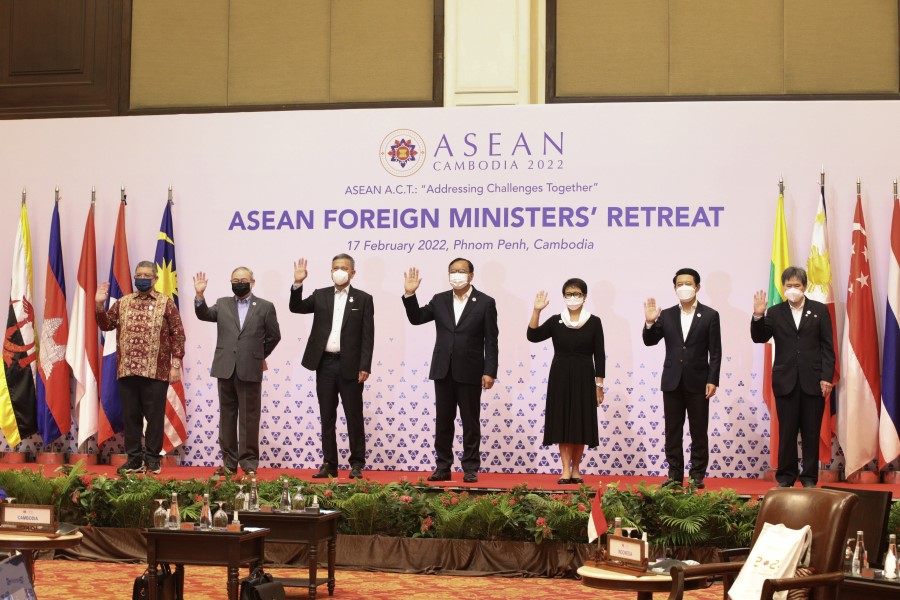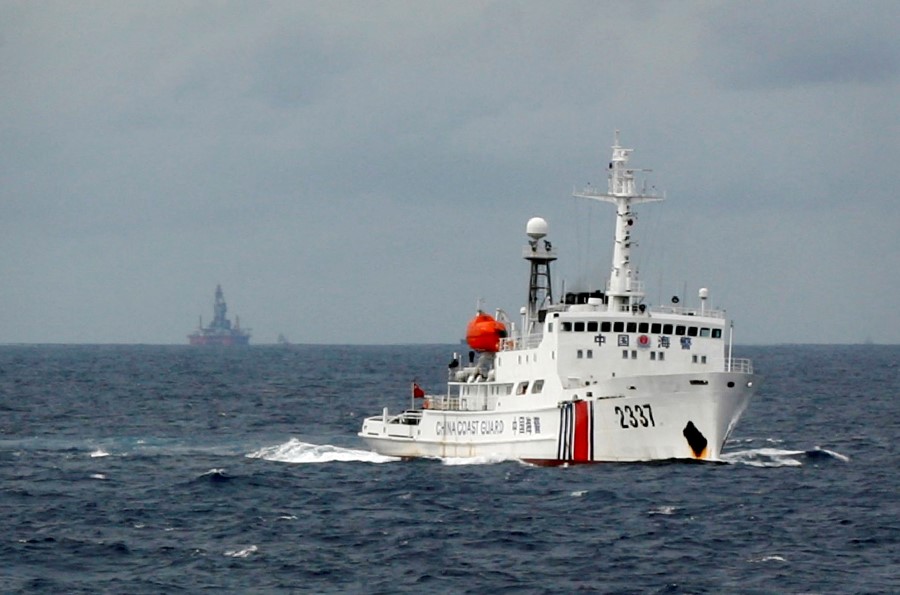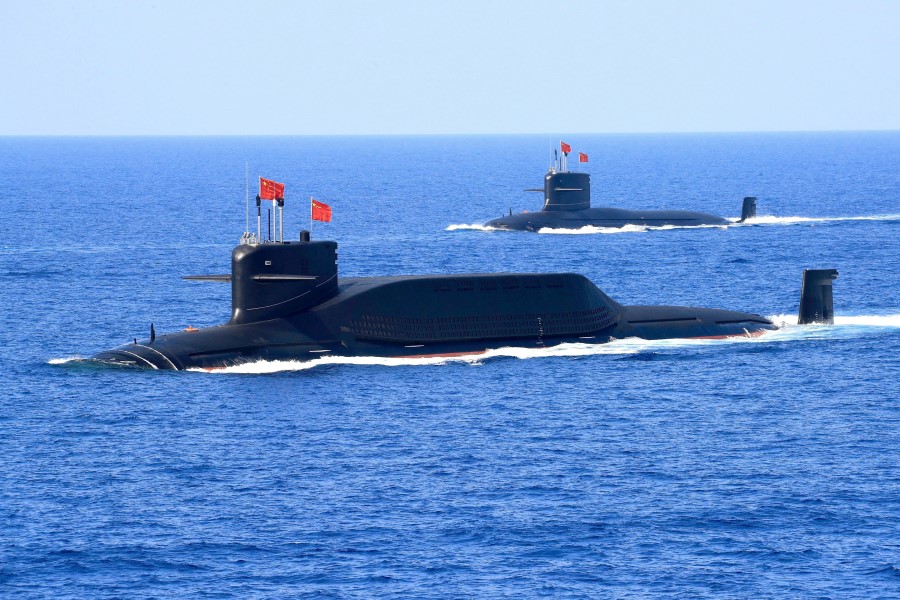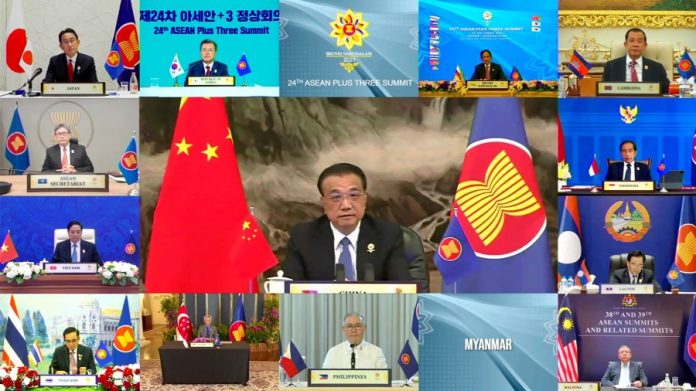The majority of Southeast Asians continue to regard China as the most influential political, strategic and economic power in the region, says the State of Southeast Asia 2022 survey report published by the ISEAS – Yusof Ishak Institute. But wariness of Chine’s rising influence has not gone away, due in no small part to China’s continued aggressive moves, especially in the South China Sea. For China, winning the hearts of ASEAN countries might take gaining trust and upholding key principles such as the rule of law, promotion of good governance and strengthening of human rights.
ASEAN-China relations reached all-time highs last year when ASEAN leaders and President Xi Jinping celebrated the 30th anniversary of their dialogue partnership. What was even more significant was the trophy title of a “comprehensive strategic partnership” accorded to China that would evidently give China a higher status over other dialogue partners.
Undoubtedly, the regional bloc recognises China’s economic importance as ASEAN’s largest trading partner. Strategically, it stands to reason that China’s political influence and military might is increasingly a source of apprehension for Southeast Asians.
The State of Southeast Asia 2022 survey report published by the ISEAS – Yusof Ishak Institute has established that China continues to be highly regarded as the most influential economic power by 76.7% of respondents from the region (a slight 0.8 percentage point increase from 2021). It is also perceived as the most influential political and strategic power in Southeast Asia with 54.4% of the vote (an increase of 4.6 percentage points from 2021), ahead of the US at 29.7%.
While it appears that China has captured the mindshare of the region, its presence is not assuring. The survey has shown that the region is generally worried about China’s growing economic influence (64.4%) as well as its growing regional political and strategic influence (76.4%). Such sentiments can potentially worsen the region’s impression of China. As such, it is not surprising that 41.7% of respondents view China as a “revisionist power” that “intends to turn Southeast Asia into its sphere of influence”.

Furthermore, the majority of Southeast Asians (58.1%) have expressed little or no confidence in China to do the right thing to contribute to global peace, security, prosperity, and governance — though the level of distrust has waned slightly from 59.6% last year. When asked to choose who ASEAN countries should align with if the region is forced to choose, over 57% of the respondents chose to align with the US over China (a slight increase of 0.8 percentage points from 2021).
In examining the whys and wherefores, among those who distrust China, 49.6% felt that China’s economic and military power could be used to threaten ASEAN countries’ interest and sovereignty. Likewise, on the question of “what could potentially worsen your positive impression of China”, the results show that a significant number of respondents (46.2%) — including all the claimant states in the South China Sea, namely, Brunei, Malaysia, Philippines, and Vietnam — have indicated that their top concern is China’s strong-arm tactics in the South China Sea and the Mekong region.
Predictably, this also resulted in the region’s (64.6% of respondents) wish for China to resolve all territorial and maritime disputes peacefully in accordance with international law. This follows China’s military build-ups in the South China Sea in recent years and the intrusions into Southeast Asian claimant states’ exclusive economic zone (EEZ), with the ambitious goal of militarily dominating the South China Sea.
Despite the international arbitral tribunal ruling in 2016 that China has no historical rights to areas within Southeast Asia’s EEZ, China did not stop but expanded its maritime militia activities and grey-zone tactics. Claimant states in Southeast Asia are also concerned about the controversial Coast Guard Law announced in January last year which allows Chinese coast guards to fire on foreign vessels in its claimed waters.

For the international community, China’s actions are not only intimidating but have clearly breached or weakened the relevance of the 1982 United Nations Convention on the Law of the Sea (UNCLOS) and the erosion of a rules-based order in the region, despite these being sacrosanct principles mentioned in numerous ASEAN documents.
To help buttress Southeast Asian claimants in their dealings with China, the US State Department issued another Limits in the Seas report in January 2022 — building on its 2014 analysis of China’s “nine-dash line” claim.
It is obvious that ASEAN needs to stand firm and cohesive to uphold these principles in pushing back China’s claims and to better control regional maritime resources, despite its dilemma of not wanting to antagonise China. This is particularly important in the ongoing negotiations for the Code of Conduct in the South China Sea (COC) to ensure that the document is kept effective, substantive and fit for protecting the interest of Southeast Asia.
Smaller ASEAN countries would not like to risk forgoing the protection provided by international law in negotiations. At the same time, China prefers diplomatic mechanisms, and does not want its actions to be constrained legally, nor does it want outside powers to be involved in the disputed waters.
However, ASEAN needs to realise that a COC that cannot preserve the maritime rights and entitlements enshrined in UNCLOS will not add value to the existing Declaration on the Conduct of Parties in the South China Sea (DOC) and will not be worth its time and effort.

China may see the need of achieving economic targets and strengthening national power (including using force to defend territorial disputes) as crucial to maintaining a high level of political legitimacy for the “party-state”.
However, the international community is not willing to deal with a more aggressive and assertive China — a point that was also highlighted in the US Indo-Pacific Strategy released earlier in the month. The last thing that China wants is to drive ASEAN closer to the US through its actions in the South China Sea or “debt-trap diplomacy” through large loans embedded within the Belt and Road Initiative (BRI).
After all, the region has expressed confidence in the US as a strategic partner and a provider of regional security. The US is also the region’s top choice leader in maintaining a rules-based order and upholding international law according to the State of Southeast Asia 2022 survey report.
The survey has indeed shed light and provided some important lessons on what drives the region. Push comes to shove, China needs to understand what matters to ASEAN. A long list of cooperation activities, big promises of economic support including through the BRI, and provision of large numbers of Covid-19 vaccines has captured the mindshare of ASEAN. However, to win the heart of ASEAN is also to gain trust and uphold key principles such as the rule of law, promotion of good governance and strengthening of human rights.
Hand in hand, China’s cooperation with ASEAN, undergirded by values that matter to the region will make China a greater winner.
By Joanne Lin / thinkchina
The views and opinions expressed in this article are solely those of the author and do not necessarily reflect the position of AsiaWE Review.




